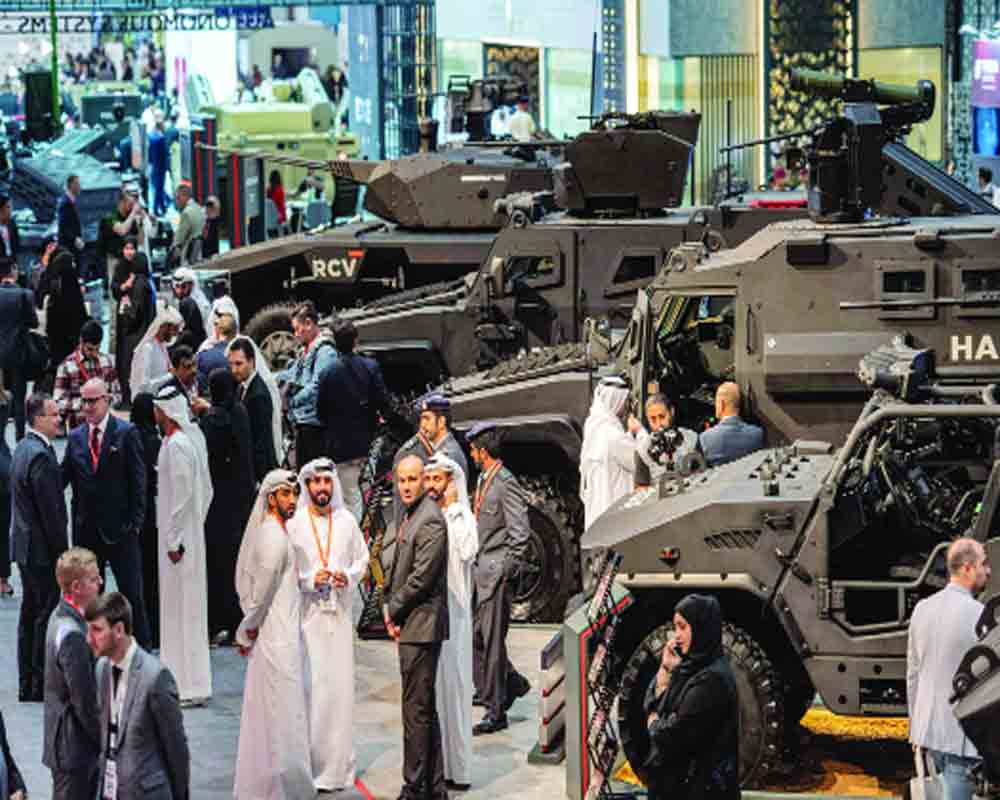In general, wars profit the arms-selling countries who supply weapons to the warring sides and make money, no matter who wins or loses
Economics is the crux of all human activities. It is the core of it all. Whether it is the necessities of food, clothing and shelter or other derived needs of humans resulting from complexities of institutional existence, money is at the centre of all activities and endeavours. And it has to be so— because it is the medium of exchange of all goods and services meant for the satisfaction of human needs and also human greed. Whereas human need is limited based on definite and finite requirements of a person, human greed knows no bounds. It is this human greed that drives humans to self-aggrandizement through all means — more foul than fair.
But economic greed is not the only vice afflicting humankind. It is the lust for power and hegemony that has led to scuffles, strife and wars. Wars today have an economic dimension much more than at any time in known world history, because of gross material technologies behind modern weaponry and more importantly the economic consequences of war.
So war costs money, big money and the destruction caused by war makes way for huge economic activity in the form of reconstruction, in which many persons or institutions gain monetarily. Many wars between nations in the past 100 years are characterized by exactly these features. So there is a sound economic reason for war, though the economic benefits of war may be heavily skewed in favour of a nation or institution. This is the stark reality of the times. Glib justifications are given for waging wars. And media houses actively collaborate and cooperate in propagating such justifications which are poor excuses or apologies for actual reasons.
The major wars of the 20th century —world wars 1 and 2 were fought for usurping states and expanding national territories. The world of the 21st century at present is on the precipice of another big war, which will involve many nation-states. Russia has been warring with Ukraine since February 2022. The war, which was expected to peter out in a few weeks, is still raging and doesn’t seem to end any time soon. Continuous supply of arms and ammunition to Ukraine by the US and NATO countries and warfare equipment supplemental support to Russia by Iran overtly and China covertly kept the war on. The economic interests of all the above countries who thus backed Russia and Ukraine were behind this.
Twenty-one months into this protracted war, another war — in the Middle East, between Hamas in Palestine territory and Israel, with major countries losing no time in declaring support for either Israel or Hamas-Palestine. The big reason behind the Hamas attack on Israel was tacit and covert military support to Hamas by China, Iran and Russia whose short- and long-term economic interests were being served by such action. Diverting the attention of the US from the Taiwan Strait and Ukraine was in the politico-economic interests of China and Russia respectively. For China, the involvement of Israel will put the recently blueprinted India-Oman-UAE-Saudi Arabia-Jordan-Israel-Europe economic corridor project in a quandary and reboot its tottering BRI. So, China is the greater gainer in inciting Hamas to this frontal attack on Israel.
In general, wars continue to profit the arms-selling countries that supply weapons to the warring countries.
The economics of war is not as simple as it is supposed to be by the countries planning or inciting wars. War leaves a terrible trail of death and destruction in its aftermath. It brings harm to all the actors involved in this game—the victor, the vanquished and the sideline supporters in a widely interconnected world. It also triggers a rat race in arms accumulation by the countries competing for territorial hegemony. It diverts resources overall from productive to nonproductive activities. Modern processes for the production of conventional and nuclear arms and much more so their usage inflict huge harm on the environment, an aspect which is, unfortunately, not seriously looked at.
The economics of war needs to be studied in a wider perspective than is done today. The economic cost of diverting valuable human and material resources from the positive and progressive activities that add value to human life to war preparedness and warmongering is humongous. This is not to say that countries should not spend on defence. But they should spend on military technologies that inflict the least harm on the common ecosphere and environment which is shared by all global countries. War also leaves huge adverse cultural effects on the countries involved directly or indirectly in it.
It promotes an atmosphere of distrust, fear, suspicion and insecurity rather than boosting fraternity and camaraderie. In other words, it undermines and disrupts peace. Inciting wars between nations also accentuates communal and sectarian friction and leads to riots and community conflicts inside nations, which detriment those nations economically. We have witnessed the economic fallouts of terrorism in many pockets across the globe—how it hinders investment and derails development. Since avenging is a natural human instinct, the nations inciting wars and terrorist activities have also faced the backlash of such actions and, of course, their adverse economic consequences. Such countries may have gained in the economic sense in the short term, but in the longer term, they will be put to huge loss. Hence, inciting wars is not an overall long-term profitable venture.
Let humanity of the present times collectively consider these important aspects and spend economic resources on national defence more prudently. Wars are destructive overall and economically regressive. A fresh new perspective on war economics and actions based thereon will make the world a better place to live in.
(The author is a management consultant based in New Delhi; views are personal)


























